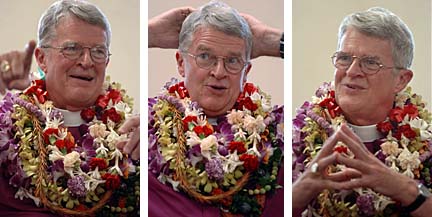LEADER VISITS ISLES

Sophomores in the Basic Christianity class at St. Andrew's Priory had a question-and-answer session with the Most Rev. Frank T. Griswold, presiding bishop of the U.S. Episcopal Church. From left are Masako Ogura, Ginger Grimes and Caressa Matsuoka.
Bishop takes up
war, gays
St. Andrew's Priory students
open the conversation with
a volley of hot-button topics
The U.S. war on Iraq "set in motion a level of chaos in that area that will take many years to be resolved," a national church leader told a Honolulu audience yesterday.
The government's decision to intervene in another country's regime shows "very unclear thinking on our part," said the Most Rev. Frank T. Griswold, presiding bishop of the Episcopal Church in the United States. "It is a stand that is extremely flawed and very dangerous."
This week, the head of the nation's 2.5 million Episcopalians is on his first pastoral visit to the Hawaii diocese. His first local appearance yesterday was at St. Andrew's Priory School, where he was greeted with leis, Hawaiian ceremony and song in the sweet, high voices of the 504-girl student body.
Griswold was then grilled with questions he might expect from adults -- issues concerning homosexual clergy, the Iraq war and moral values.
"I don't think we understand the complexities of (Islamic) society," said Griswold, who has expressed criticism of the Iraq war since before the 2003 invasion in letters to President Bush and in national media interviews. In May, he joined with 35 other denominations in the National Council of Churches asking Bush to turn over the transition of government in Iraq and postwar reconstruction to the United Nations.

» "Although abortion is legal, does the Episcopal church believe it is moral or ethical?"
"In patriotism, people say we only do good, so any criticism is unpatriotic. The notion that any criticism is unchristian, unpatriotic ... that troubles me," he said. "The prophets were not shy about criticizing the government when it was not serving the people."
The bishop told the students: "If we think we are always right, we are in serious danger of going as far from God as you can get."
In answering questions about homosexuality, Griswold explored the different approaches to Scripture that are the basis for argument in his denomination and throughout Christianity.
"There are people who say that if the Bible says it, that's the way it is," he said. "For some of us, the Bible has to be taken in terms of its historical context. Many things written in the Bible are different from what we have learned since about the cosmos, about health and disease. In Scripture there is the notion that if you are sick, you are sinful."
The Bible was written with a viewpoint that everyone is heterosexual, he said, "so anything different from that was wrong. We know more now about the complexity of humans. Some people are naturally drawn in their affections to the same gender. It is not necessarily sinful," Griswold said.
He compared the controversy to past struggles over civil rights and women's right to vote. "I think the reality of gay people and the integrity of their lives" is becoming accepted in society, he said. "It will take a long time for this issue to find its place without controversy."
[News] [Business] [Features] [Sports] [Editorial] [Do It Electric!]
[Classified Ads] [Search] [Subscribe] [Info] [Letter to Editor]
[Feedback]
